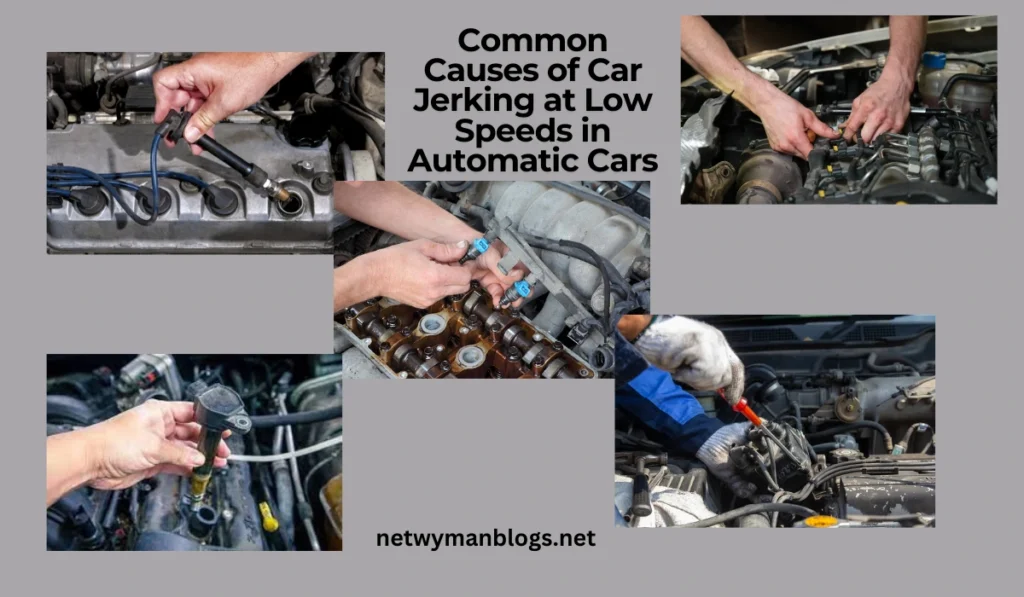If you notice that your Car Jerks When Accelerating at Low Speeds Automatic, you are not alone. This issue is fairly common among drivers and can be caused by a variety of underlying problems. Car jerking is often a symptom that something is amiss in your vehicle’s engine, fuel system, or transmission. Knowing the reasons behind this jerking and how to address it can save you from unexpected breakdowns and ensure a smooth driving experience.
Understanding Why Your Car Jerks When Accelerating at Low Speeds Automatic
When a car jerks at low speeds, it disrupts the driving experience and sometimes even feels alarming. For automatic car owners, this jerking sensation can be particularly confusing since automatic transmissions are designed to handle gear shifts smoothly. The problem may stem from issues such as clogged fuel injectors, worn-out spark plugs, or even more complex transmission-related concerns. Before diving into specific solutions, let’s examine what it means when your car jerks while accelerating at low speeds.
Car jerking during low-speed acceleration is often an indicator that the engine or transmission is not receiving the necessary balance of fuel and air. The car may hesitate or stutter when you press the gas pedal, especially if there is an issue with fuel delivery or airflow. Additionally, jerking may be caused by electronic issues, such as a faulty sensor, that disrupts the smooth communication between the engine and transmission.
Common Causes of Car Jerking at Low Speeds in Automatic Cars

There are several reasons why a Car Jerks When Accelerating at Low Speeds Automatic, and identifying the exact cause is essential for a proper fix. Here are some of the most frequent causes of jerking in automatic vehicles.
1. Clogged Fuel Injectors
Fuel injectors are responsible for delivering the right amount of fuel to the engine. Over time, these injectors can become clogged with dirt, dust, and fuel deposits. When fuel injectors are clogged, they struggle to deliver fuel consistently, leading to an uneven fuel-air mixture. This inconsistency often results in the engine hesitating or jerking, especially during low-speed acceleration. Regular cleaning of fuel injectors can often resolve this issue.
2. Worn-Out Spark Plugs
Spark plugs play a critical role in igniting the air-fuel mixture in the engine. When Worn-Out Spark Plugs wear out or become damaged, they may not ignite the fuel efficiently, causing the engine to misfire. This misfiring results in a jerking sensation as you accelerate. Replacing worn-out spark plugs can restore smooth engine performance and eliminate the jerking issue.
3. Dirty Air Filter
The air filter prevents dirt and debris from entering the engine. Over time, it can become clogged, limiting the amount of air that reaches the engine. A restricted airflow disrupts the fuel-air mixture, causing the engine to run inefficiently. This imbalance may lead to jerking when accelerating at low speeds. Replacing the air filter regularly can prevent this issue and maintain optimal engine performance.
4. Faulty Mass Air Flow (MAF) Sensor
The MAF sensor measures the amount of air entering the engine and sends this information to the engine control unit (ECU). A faulty MAF sensor may send incorrect data to the ECU, leading to an improper fuel-air ratio. This can cause the engine to hesitate or jerk during acceleration. Cleaning or replacing the MAF sensor can help resolve this problem.
5. Low Transmission Fluid
Transmission fluid lubricates the internal components of the transmission, ensuring smooth gear changes. Low transmission fluid levels can lead to slipping or rough shifts, which may cause the car to jerk when accelerating. Checking and refilling transmission fluid according to the manufacturer’s recommendations can help maintain smooth acceleration.
6. Faulty Oxygen Sensor
Oxygen sensors monitor the amount of oxygen in the exhaust gases, allowing the engine to adjust the fuel-air mixture. A faulty oxygen sensor may cause the engine to run too rich or too lean, leading to jerking during acceleration. Replacing a faulty oxygen sensor can improve fuel efficiency and reduce jerking.
Read more: Titaniumshare life
Solutions to Stop Car Jerking During Low-Speed Acceleration
Addressing the root cause of jerking when accelerating at low speeds in automatic vehicles requires specific maintenance and sometimes professional assistance. Here’s a breakdown of potential solutions for each cause.
| Clean or replace the MAF sensor | Solution |
|---|---|
| Clogged Fuel Injectors | Clean or replace fuel injectors |
| Worn-Out Spark Plugs | Replace spark plugs |
| Dirty Air Filter | Replace air filter |
| Faulty MAF Sensor | Clean or replace MAF sensor |
| Low Transmission Fluid | Check and refill transmission fluid |
| Faulty Oxygen Sensor | Replace oxygen sensor |
How to Recognize and Prevent Jerking Issues in Automatic Cars
It’s important to recognize the signs indicating your car jerks when accelerating automatically at low speeds. Some drivers may notice a loss of power, a delayed response when pressing the accelerator, or a hesitation before the car picks up speed. Here are some tips to prevent jerking and ensure your car operates smoothly.
- Regular Maintenance: Routine maintenance, such as replacing spark plugs, and air filters, and checking fluid levels, can help prevent jerking issues.
- Fuel Injector Cleaning: Periodically cleaning fuel injectors can prevent clogging and ensure consistent fuel delivery.
- Watch for Warning Lights: The check engine light often indicates issues with sensors, which may be causing the jerking.
- Listen for Unusual Sounds: Grinding, knocking, or ticking sounds can indicate issues with the engine or transmission, which may contribute to jerking.
Read more: Jojoy gta 5
Frequently Asked Questions
Why does my car jerk when accelerating at low speeds automatic?
This issue is often caused by fuel delivery problems, such as clogged fuel injectors, or issues with ignition components, such as worn-out spark plugs.
Can low transmission fluid cause jerking?
Yes, low transmission fluid can cause slipping or rough shifting, leading to jerking during acceleration.
Is it safe to drive if my Car Jerks When Accelerating at Low Speeds Automatic?
While it may be safe for short distances, jerking can indicate underlying problems. It’s best to address the issue promptly to prevent further damage.
How can I prevent my car from jerking when accelerating?
Regular maintenance, such as replacing spark plugs, checking transmission fluid, and cleaning fuel injectors, can help prevent jerking issues.
Conclusion
When a Car Jerks When Accelerating at Low Speeds Automatic, it’s more than just a minor inconvenience. Jerking can signify a variety of issues, from clogged fuel injectors to faulty oxygen sensors. Understanding the causes of jerking and taking the necessary steps to address them can make your driving experience safer and more comfortable.
Regular maintenance, including checking fuel injectors, spark plugs, and fluid levels, plays a crucial role in preventing car jerking. Addressing these issues not only enhances your vehicle’s performance but also prolongs its lifespan. If you experience consistent jerking while accelerating, don’t ignore it. Consult a professional mechanic to diagnose and fix the issue.
By staying vigilant and performing routine checks, you can keep your car running smoothly and avoid the discomfort of jerking during acceleration. Remember, a well-maintained car ensures a better driving experience and helps you avoid costly repairs down the road.

